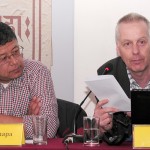
Worldwide, guns are a topic wrought with emotions. While most democratic countries consider guns in private hands a severe risk for public health if uncontrolled, it is not just in the US that licencing laws face resistance that benefit from a political and emotional rejection of state interference (e.g. UKIP’s Nigel Farage earlier this year). But why and how are ‘gun cultures’ built and sometimes sustained, even if they might undermine, an EU-led, much-desired democratisation and peace-building process after violence and war?
Dr Stephanie Schwandner-Sievers, social anthropologist at the HSC, addressed this question in her presentation ‘Guns, Pride and Agency—Albanian Ideals of Militancy Before and After the 1999 War in Kosovo’, at the international conference Comparing Civil Gun Cultures: Do Emotions Make the Difference? at the Max Planck Institute in Berlin from August 26 to 28, 2014 (https://www.mpib-berlin.mpg.de/en/research/history-of-emotions/conferences/comparing-civil-gun-cultures-do-emotions-make-the-difference). The wider ethnographic research project, on which her findings are based, was also subject of an interview earlier this year, published on a research blog of the London School of Economics: http://blogs.lse.ac.uk/lsee/2014/04/03/ilegalja-terrorists-or-freedom-fighters-an-albanian-tale-from-yugoslav-times/ .
Congratulations!
Prof. Edwin van Teijlingen
CMMPH
 Social Science Baha lecture series Nepal
Social Science Baha lecture series Nepal










 Beyond Academia: Exploring Career Options for Early Career Researchers – Online Workshop
Beyond Academia: Exploring Career Options for Early Career Researchers – Online Workshop UKCGE Recognised Research Supervision Programme: Deadline Approaching
UKCGE Recognised Research Supervision Programme: Deadline Approaching SPROUT: From Sustainable Research to Sustainable Research Lives
SPROUT: From Sustainable Research to Sustainable Research Lives BRIAN upgrade and new look
BRIAN upgrade and new look Seeing the fruits of your labour in Bangladesh
Seeing the fruits of your labour in Bangladesh ECR Funding Open Call: Research Culture & Community Grant – Apply now
ECR Funding Open Call: Research Culture & Community Grant – Apply now ECR Funding Open Call: Research Culture & Community Grant – Application Deadline Friday 12 December
ECR Funding Open Call: Research Culture & Community Grant – Application Deadline Friday 12 December MSCA Postdoctoral Fellowships 2025 Call
MSCA Postdoctoral Fellowships 2025 Call ERC Advanced Grant 2025 Webinar
ERC Advanced Grant 2025 Webinar Update on UKRO services
Update on UKRO services European research project exploring use of ‘virtual twins’ to better manage metabolic associated fatty liver disease
European research project exploring use of ‘virtual twins’ to better manage metabolic associated fatty liver disease